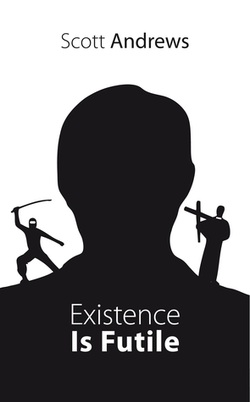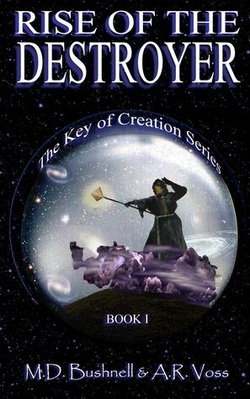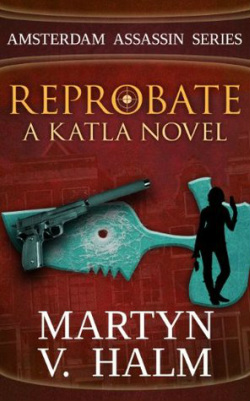
I was provided a copy of this book through Goodreads’ READ IT AND REAP program in exchange for my fair and honest review. I thank the author for providing me with this opportunity.
EXISTENCE IS FUTILE is interesting in that it does not fit any clearly definable genre---or at least not one that I recognize. It is the story of a man who, following his wife’s death, finds himself struggling to determine whether he is sane. Or was it all a dream? Had Henry’s life in fact gone an entirely different way because years back he had decided to go to Asia with Julia after all? The truth is—I’m not sure. In any case, EXISTENCE tells of Henry’s struggle with accepting the loss of his wife, a woman whom it is clear, Henry loved dearly. I found this theme of EXISTENCE rather precious.
I have to address one issue that I admit, I found difficult to overlook. When it first struck me, I questioned myself, but it kept coming up. So, finally, I checked out Grammar Girl at http://grammar.quickanddirtytips.com/... where I read: “Restrictive Clause—That; Nonrestrictive Clause—Which.” Apparently, the “quick and dirty tip” is to remember that “you can throw out the ‘whiches’ and no harm will be done. . . . On the other hand, if it would change the meaning to throw out the clause, you need a ‘that.’” The reason I mention this is that, aside from anything I thought about the story, within just the first paragraphs, there were a number of uses of “which” for “that.” I apologize if this seems silly or over-critical, but it did distract me, repeatedly, from the story. On the other hand, this would be a fairly easy editing exercise. . . .
Back to the story. As noted above, I am not altogether sure what happened in EXISTENCE, but I do know that one particular line stood out and left me with a question. In Existence, the main character, Henry, had written a bestseller, “The Futility of Sheep,” a book in which Henry argued that there is no God and that nothing would ever convince him to the contrary. People who believe are mindless sheep, waiting for someone else to lead. Henry writes: “The key difference between God and nature is that there is actual evidence of nature everywhere we look. Whereas there is not a single shred of evidence which supports the existence of a supernatural omnipotent omnipresent being which created all.” So, I was struck, when Henry went to his now-dead wife’s former psychiatrist’s office to try to find answers about Julia. While looking in the file cabinet for Julia’s file, Henry stood up, “awash with a confidence. . .” and “said a silent prayer.” Why?
EXISTENCE IS FUTILE is interesting in that it does not fit any clearly definable genre---or at least not one that I recognize. It is the story of a man who, following his wife’s death, finds himself struggling to determine whether he is sane. Or was it all a dream? Had Henry’s life in fact gone an entirely different way because years back he had decided to go to Asia with Julia after all? The truth is—I’m not sure. In any case, EXISTENCE tells of Henry’s struggle with accepting the loss of his wife, a woman whom it is clear, Henry loved dearly. I found this theme of EXISTENCE rather precious.
I have to address one issue that I admit, I found difficult to overlook. When it first struck me, I questioned myself, but it kept coming up. So, finally, I checked out Grammar Girl at http://grammar.quickanddirtytips.com/... where I read: “Restrictive Clause—That; Nonrestrictive Clause—Which.” Apparently, the “quick and dirty tip” is to remember that “you can throw out the ‘whiches’ and no harm will be done. . . . On the other hand, if it would change the meaning to throw out the clause, you need a ‘that.’” The reason I mention this is that, aside from anything I thought about the story, within just the first paragraphs, there were a number of uses of “which” for “that.” I apologize if this seems silly or over-critical, but it did distract me, repeatedly, from the story. On the other hand, this would be a fairly easy editing exercise. . . .
Back to the story. As noted above, I am not altogether sure what happened in EXISTENCE, but I do know that one particular line stood out and left me with a question. In Existence, the main character, Henry, had written a bestseller, “The Futility of Sheep,” a book in which Henry argued that there is no God and that nothing would ever convince him to the contrary. People who believe are mindless sheep, waiting for someone else to lead. Henry writes: “The key difference between God and nature is that there is actual evidence of nature everywhere we look. Whereas there is not a single shred of evidence which supports the existence of a supernatural omnipotent omnipresent being which created all.” So, I was struck, when Henry went to his now-dead wife’s former psychiatrist’s office to try to find answers about Julia. While looking in the file cabinet for Julia’s file, Henry stood up, “awash with a confidence. . .” and “said a silent prayer.” Why?




